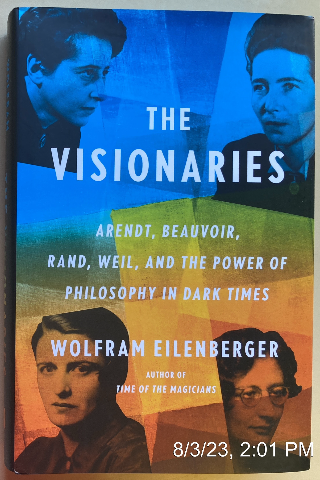-
유대인의 양심 Hannah Arendt -- "The Visionaries" by W. Eilenberger책 읽는 즐거움 2023. 11. 24. 12:07
.

Wolfram Eilenberger, "The Visionaries: Arendt, Beauvoir, Rand, Weil, and
the Power of Philosophy in Dark times" (2020 in German; 2023 in English)
뉴욕 타임즈 서평 by Jennifer Szalai (8/2/2023)
Ayn Rand (표지 사진에서 좌하단), Hannah Arendt (좌상), Simone de Beauvoir (우상), Simone Weil가 20대 중반에서 30대 후반의 나이이던 1933년에서 1943년 사이의 이야기다. 지금 읽어보니, 위 서평이 내용을 잘 말해준다. Chapter V까지 읽고 나니 흥미를 잃게 되고 시간이 아깝다는 생각이 들어서, Coda와 그 앞의 Chapter VIII를 읽고 Chapter VI, VII에서는 Hannah Arendt에 관한 부분만 읽었다. 책은 도서관에 기증해야겠다.
"유대인의 양심 Hannah Arendt"는, 저자가 아니라, 내가 하는 말이다. Chapter VIII에서 인용한 아래 구절들에 의하면, 팔레스타인에 소수 그룹인 유대인을, 말하자면, 1등 국민, 그리고 다수 그룹인 아랍인은, 투표권도 없는, 2등 국민으로 해서 나라를 세우기로 한 1942년 Zionist conference의 결정에 Arendt는 격분했지만, Arendt의 오랜 친구이다가 나중에 그녀의 책 "Eichmann in Jerusalem"을 비난하며 친구 관계를 끊은, Gershom Scholem의 반응은 어땠는지 모르겠다.
p. 287
When leading members of the Zion movement met for an extraordinary conferance in New York's Biltmore Hotel on May 9 [1942], discussions were under twofold strain.... Clearly, the mass murder of Europe's Jews was thus entering a hitherto unimaginable phase. This lent new urgency to the Zionist demand for an easing or even lifting of immigration restrictions to the British protectorate of Palestine. At the same time, the scenario of an Allied victory was appearing on the horizon, providing the prospect of a politically independent Palestine as a homeland for the Jewish people. Arendt took part in the conference as an observer and was horrified by the decisions made there.
p. 289
According to the resolutions made in the Biltmore Hotel under the chairmanship of the social democrat (and future prime minister of Israel) David Ben-Gurion, it was on precisely this model of an ethnically homogeneous nation-state that Jewish people should seek to create their homeland in Palestine. Aside from the demand for permission for two million European Jews to settle there, this congress resolved on the vision of Palestine as a "Jewish Commonwealth." The actual Arab majority population that also lived there was to be given only minority rights (not including the right to vote).
Arendt was filled with fury and, even more than that, with despair. She saw the biltmore resolution in the name of Zionism as a version of the ideal behind the solution to the "Jewish question," which she was convinced had led to anti-Semitism and also to a "Jewish question" in the modern sense of the term: the idea of a nation-state ideally forming a completely binding unity of people, territory, and state -- in which the Jews as a people must inevitably be seen as a deeply disturbing Other.
For Arendt, the Biltmore resolutions were a profound error, in fact a betrayal of the originally emancipating goals of the Zionist movement. In terms of realpolitik, she also considered them both nonsensical and, in the medium term, self-destructible. In her many raging articles over the following weeks and months she described as absurd the idea that a majority (Arabs) within a democratic Jewish Commonwealth should be granted only minority rights.
p. 290
The Biltmore Conference marked Arendt's definitive break with institutionalized Zionism. Still she did not doubt that there might be something like a "Jewish people" that had preserved itself in time and space over the millennia as a politically effective unit and deserved free self-determination as a people. And similarly, as a Jew, she continued to support the ideal expressed by Theoder Herzl of creating a national homeland for the Jewish people.
p. 291
Admittedly, this form of Jewish patriotism with a cosmopolitan intent made her a lone voice in New York's concrete desert.... Even at a time when the Jewish people in Europe were gazing into the abyss of their extinction, she did not spare the sarcasm, the divisive irony, or arguments that amounted to equating Nazi racism with Jewish nationalism. With her eyes wide open, she caused bad blood as a public intellectual. She believed that she owed it to herself and her people. In the name of truth, justice -- and freedom of open and public discourse.
'책 읽는 즐거움' 카테고리의 다른 글
Ilyon Woo, "Master Slave Husband Wife" | J. Sanction, "Mad House at the End of the Earth" (0) 2023.12.15 Frédéric Gros, "A Philosophy of Walking" | 정현종, "어떤 적막" (0) 2023.12.01 Carlo Rovelli, "White Holes"--- '자유의지' (0) 2023.11.23 Carlo Rovelli, "Reality Is Not What It Seems" (0) 2023.11.18 Arthur Koestler, "Thieves in the Night" (0) 2023.11.09